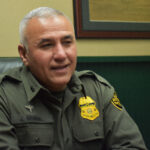Maine author revisits MH bank heist
Delves into personality of mastermind behind the crime
TOPSHAM, Maine — Author Ron Chase is channelling an infamous County crime in his newest book, and hopes the story leaves readers not only entertained, but with a clearer picture of the man who orchestrated the crime.
“The Great Mars Hill Bank Robbery” is scheduled to be published Feb. 10, 2016 by Down East Books, and is Chase’s first book since his outdoors guide, “Mountains for Mortals – New England.”
The book details the 1971 robbery of Mars Hill’s Northern National Bank by Bernard Patterson, described as “a much-decorated Vietnam War hero turned real-life version of Dox Quixote, Butch Cassidy and Robin Hood all rolled into one.”
“It’s quite exciting,” Chase said Thursday from his home in Topsham. “It’s an idea that kind of had its inception about 40 years ago, but I never wrote professionally until I retired from the IRS, which was about 11 years ago. I wrote a mountain guide book, but this is my first ‘real’ book, if you will.”
The story is one that Chase has had in the back of his mind for years. “I first read it back in 1973 when the Bangor Daily News did a series on it. I sort of related to it; I won’t say it inspired me, because I never wanted to be a bank robber, but I related to it. He (Patterson) and I grew up in similar circumstances and entered the military when we were young, and both were affected by it.”
Chase recounted there was a dichotomy at the time between those who served in the military and those who didn’t. “I did not see combat,” he said. “But when we re-entered society, there was a sense that we were different, that we were sort of outsiders. When I read about his escapades, I related to his frustrations.”
The crime
The book relates the story of the night of Nov. 12, 1971, when Patterson carried out the robbery, as well as his escape and later life as he, according to Amazon.com, “lived a raucous life of wine and women.” Patterson’s cross-country adventures were happening, ironically, at the same time D.B. Cooper’s infamous tale was playing out in the skies.
Chase details the robber’s trek through the Prestile Stream wilderness and behind Mars Hill Mountain; meanwhile, police, sheriffs, Canadian Mounties and the FBI undertook what he calls “the largest law enforcement investigation in the history of northern Maine.”
Investigators found no leads — but this was Aroostook County, after all. The locals had their own theories, and speculation was made with pinpoint accuracy over coffee.
“On Saturday morning, several of Bernard’s friends met at Al’s Diner for coffee. The bank robbery was the only topic of conversation. Almost all of them guessed Bernard had committed the crime. One person wrote his name on a piece of paper and stored it away in his safe deposit box so he could later prove he’d made the correct prediction. The FBI may have been uncertain about the identity of the perpetrator, but there was little confusion at Al’s Diner.”
The criminal
“The story, I think, sort of captures your imagination,” explained Chase. “I think that Bernard is a very compelling character. I personally wish I’d known him. He’s very interesting; he did some things that were obviously quite bad … but he had something about his personality. People liked him and felt loyal to him.”
The author interviewed many local people as he researched Patterson, from those who remembered the crime, to some who were actually in the bank, to various professionals — including bank managers.
“They would invariably say, ‘Bernard was a friend and I won’t be a part of anything that denigrates him.’ He had a compelling personality that stimulated loyalty from unusual sources.”
Chase said he felt he came to know Patterson through his research and many interviews. “He was almost totally fearless and extremely intelligent. In many respects, in an adverse sort of way, it was reflected in some of the things that he did.”
The book
From its inception to reality, Chase estimated the book took about a year to complete. “After I wrote my guide book, I was just trying to come up with something that would sell, something that I was interested in,” he added.
A chance encounter on top of a mountain in New Hampshire set him on course.
“In January 2013, while on a winter mountaineering trip in New Hampshire, I met a fellow named Peter King who had known him; Bernard died in 2003. After a long conversation, I decided to propose writing a book about his story.”
Chase described himself as semiretired, and pursued the book part-time. “I spent a few hours every week for over a year, and as I got closer to the end, especially when I was finalizing the manuscript, I spent quite a bit of time. The last two months, I was probably putting maybe as much as 30 hours a week.”
The author said he hopes to promote his book regionally. “In fact, one of my goals is to perhaps come up there and do a little marketing. I hope to do that throughout the state, and I’m even going to try to move beyond the state.”
The author
Chase lives in Topsham with his wife, Nancy, a semiretired professional CPA.
Their son Eric, his wife Hannah and granddaughter Raina live between New York City and Michigan; Eric is a production manager and Hannah, a retired professional dancer, teaches dance at a Michigan college. Their youngest son, Adam, is a law school graduate doing some production construction work in New York City, often working in tandem with his brother in the production business.
Contemplating what’s next for him, Chase has a couple of ideas in mind.
“I’ve been trying to sell a ‘Catch-22’-style version of life in the IRS, somewhat autobiographical,” he said. While he’s had a few bites, so far no publisher has committed.
Another idea stems from his growing-up years in Gardiner in the mid-1960s.
“My grandfather was a policeman who was murdered in the line of duty. My employer was murdered about a year later. I would suggest that there was no justice. I am very interested in the idea of writing a book that blends in both of those murders and stories and what I believe were the injustices that resulted.”
In any case, he is hopeful that “The Great Mars Hill Bank Robbery” resonates with readers.
“The other thing that I think people can take away from this story, aside from the comedic nature of [Patterson’s] escapades, is the impact that war has on people. And I think PTSD was a huge player in the decisions that he made after he left the military, and I think that’s a sobering thing that we can learn a little from.”
For more about the author, contact him at ronchaseoutdoors@comcast.net.







